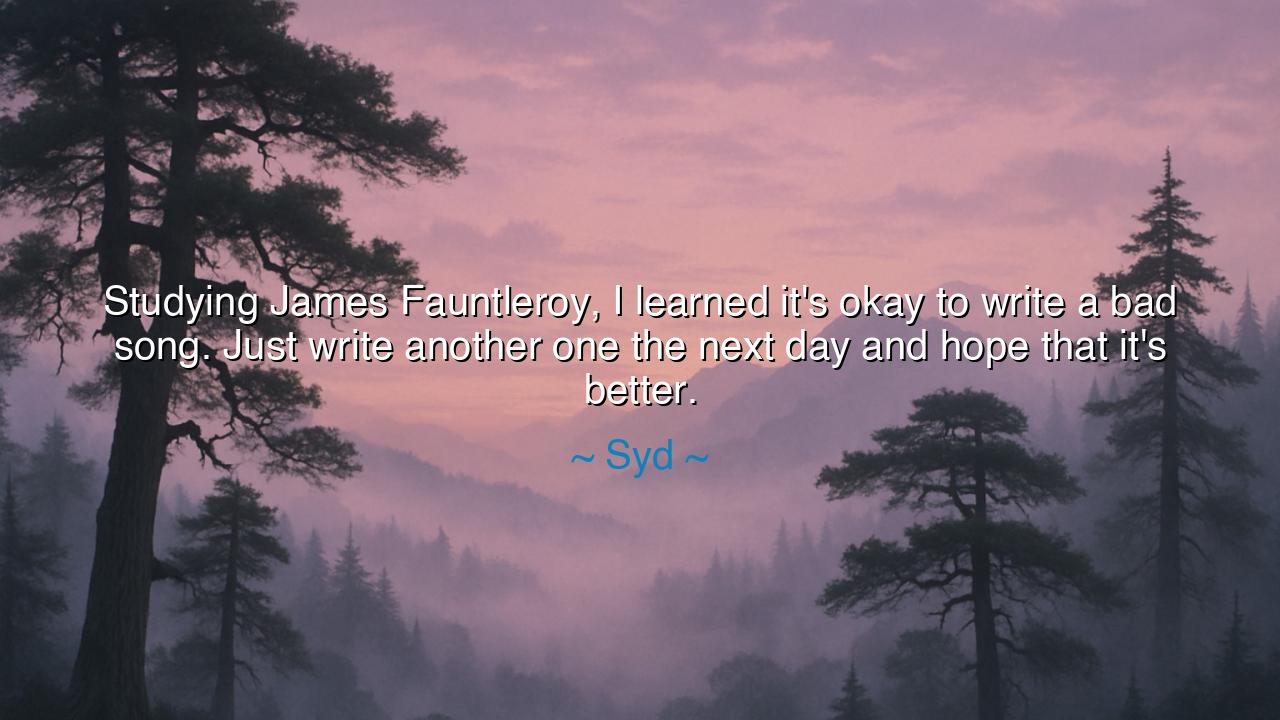
Studying James Fauntleroy, I learned it's okay to write a bad
Studying James Fauntleroy, I learned it's okay to write a bad song. Just write another one the next day and hope that it's better.






Hear now the words of Syd, a voice of quiet wisdom from our modern age, who once said: “Studying James Fauntleroy, I learned it's okay to write a bad song. Just write another one the next day and hope that it's better.” Though these words speak of music, their spirit belongs to all creation, to every art, craft, and labor under the sun. Beneath their simple rhythm lies a timeless truth: that greatness is not born from perfection, but from persistence—that the path to mastery is not paved with flawless triumphs, but with the courage to begin again.
In the ancient days, the sculptor Phidias, who shaped the mighty Zeus of Olympia, did not achieve divinity in marble at his first strike of the chisel. He, too, must have faced the dull clang of failure, the shattered stone, the form that would not emerge. But he returned each morning, steady as the rising dawn, and carved again. In his persistence lived the spirit of what Syd speaks—a spirit that knows that imperfection is the first language of creation, and that every “bad song,” every broken attempt, is not waste, but foundation.
James Fauntleroy, the muse of this teaching, is known among artists as one who writes without fear of error, who trusts the process more than the outcome. In him, Syd found a revelation: that to be human is to create, fail, and continue. This, too, echoes the wisdom of the ancients. Did not Homer himself, in his blindness, recite his verses over and over before they became the immortal Iliad? Did not Leonardo da Vinci fill his journals with abandoned sketches before the Mona Lisa smiled her eternal smile? The divine fire of genius does not descend upon those who wait for perfection, but upon those who dare to act, again and again, despite imperfection.
The heart of this quote lies in humility and hope. It teaches that to stumble is not to fail, but to live the truth of being an artist—or indeed, a human being. For the one who cannot bear to make a bad thing will never make a great one. Every song, poem, or idea that falters is a bridge to something greater. As the ancients taught, the river does not curse the stone it cannot yet move; it flows around it, returning with patience, until it shapes even the hardest rock.
There is an ancient Japanese saying: “Fall seven times, stand up eight.” So too must the artist, the thinker, the dreamer. Syd’s words call us to this quiet heroism—to the discipline of daily creation, to the sacred act of trying again. The “bad song” is not a mark of shame, but a teacher in disguise, whispering what must be learned before beauty can emerge. The ancients would have called this practice areté—the pursuit of excellence through constant striving.
And what of us, the listeners, the seekers of meaning? We, too, must heed this counsel. Whatever our craft—whether we write, teach, build, love, or lead—we must remember that failure is not an ending but a rhythm, a pulse within the larger song of our becoming. To write another one the next day is to proclaim faith in the future, to declare that today’s imperfection does not define tomorrow’s promise.
So let us act, dear reader, as those who understand the cycles of creation. Let us begin without fear, and continue without despair. When our work falters, let us return to it with gentleness and strength. For the gods do not favor those who are flawless, but those who are faithful. The lesson of Syd and Fauntleroy is not merely for musicians—it is for all who would live meaningfully: to create, to endure, and to believe that tomorrow’s song may yet be better than today’s.
Thus, take this as a commandment of the spirit: Do not seek perfection—seek persistence. Let your failures sing softly beside your triumphs, for both belong to the same melody. And when you falter, remember the wisdom of the ancients and of Syd alike—just rise again, and write another song.






AAdministratorAdministrator
Welcome, honored guests. Please leave a comment, we will respond soon